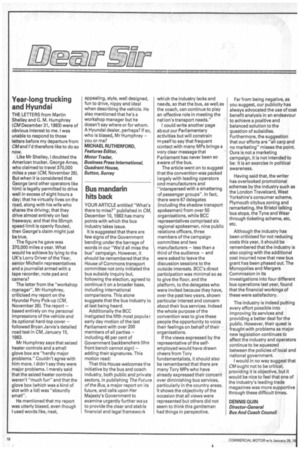Bus mandarin hits back
Page 22

If you've noticed an error in this article please click here to report it so we can fix it.
YOUR ARTICLE entitled "What's there to miss?" published in CM, December 10, 1983 has many points with which the bus industry takes issue.
It is suggested that there are few signs of the Government bending under the barrage of words in our "We'd all miss the bus" campaign. However, it should be remembered that the House of Commons transport committee not only initiated the bus subsidy inquiry but, following the election, agreed to continue it on a broader base, including international comparisons. This alone suggests that the bus industry is at last being heard.
Additionally the BCC instigated the fifth most popular early day motion of the last Parliament with over 200 members of all parties — including 46 per cent of Government backbenchers (the front bench cannot sign) — adding their signatures. This motion read: That this House welcomes the initiative by the bus and coach/ industry, both public and private sectors, in publishing The Future of the Bus, a major report on irts future, and calls upon Her Majesty's Government to examine urgently further ways to provide the clear and stable financial and legal framewo rk which the industry lacks and needs, so that the bus, as weltas the coach, can continue to play an 'affective role in meeting the nation's transport needs."
I could write another page about our Parliamentary activities but will constrain myself to say that frequent contact with many MPs brings a very clear message that Parliament has never been so a ware of the bus.
The article went on to suggest that the convention was packed largely with leading operators zind manufacturers and "interspersed with a smattering Inf passenger groups". In fact, 'there were 67 delegates (including the shadow transport spokesman) from over 50 organisations, while BCC representatives comprised six regional spokesmen, nine public relations officers, three members of the campaign committee and two manufacturers — less than a third of the audience — and were asked to leave the discussion sessions to the outside interests. BCC's direct participation was minimal so as to give the floor, and the platform, to the delegates who were invited because they have, over the past two years, shown particular interest and concern about their bus services. Indeed the whole purpose of the convention was to give these people the opportunity to voice their feelings on behalf of their organisations.
If the views expressed by the representative of the selfemployed would have drawn cheers from Tory fundamentalists, it should also be remembered that there are many Tory MPs who have already expressed their concern over diminishing bus services, particularly in the country areas. It shows the objectivity of the occasion that all views were represented but others did not seem to think this gentleman had things in perspective. Far from being negative, as you suggest, our publicity has always advocated the use of cost benefit analysis in an endeavour to achieve a positive and balanced solution to the question of subsidies. Furthermore, the suggestion that our efforts are "all carp and no marketing" misses the point. Ours is not a marketing campaign, it is not intended to be: It is an exercise in political awareness.
Having said that, the writer has overlooked promotional schemes by the industry such as the London Travelcard, West Yorkshire's consumer scheme, Plymouth citybus zoning and remarketing, the Bristol talking bus stops, the Tyne and Wear through ticketing scheme, etc, etc.
Although the industry has been criticised for not reducing costs this year, it should be remembered that the industry is also coping with the additional cost incurred now that new bus grant has been phased out. The Monopolies and Mergers Commission in its investigations into four different bus operations last year, found that the financial workings of these were satisfactory.
The industry is indeed putting every effort possible into improving its services and providing a better deal for the public. However, their quest is fraught with problems as major new legislation continues to affect the industry and operators continue to be squeezed between the policies of local and national government.
I would in no way suggest that CM ought not to be critical, providing it is objective, but it would be nice to feel that one of the industry's leading trade magazines was more supportive through these difficult times.
DENNIS QUIN Director-General Bus And Coach Council










































































